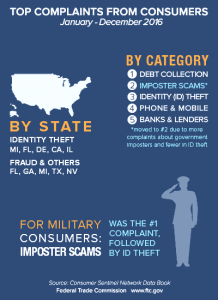Scams soaring; feds urge communities to report them
SAN FRANCISCO — Impostor scam complaints became the second most common category of consumer complaints from identity theft for the first time in 2016 even as debt collection complaints still held on the first spot with 28 percent of total complaints despite a slight decline from its number in 2015.
This was reported in the latest annual consumer data book released by the Federal Trade Commission (FTC), which summarizes the more than three million reports the commission got from people around the country and were discussed in a recent teleconference with ethnic media organized by the New America Media.

Federal Trade Commission Acting Associate Director Federal Trade Commission Bureau of Consumer Protection Monica Vaca reports that calls to consumers from government impostors are in increasing number. INQUIRER/Jun Nucum
Known as the FTC’s Consumer Sentinel Data Book, it has both national statistics and state-by-state listings of the consumer protection issues reported to the FTC in 2016.
In the teleconference, Acting Associate Director Federal Trade Commission Bureau of Consumer Protection Monica Vaca relayed that consumers are telling the FTC that they’re receiving calls from government impostors in increasing numbers.
“The most notorious government impostors scam is the Internal Revenue Service (IRS) call that says you owe taxes that you never paid and you are going to be fined, you are going to prison or you are going to be arrested if you don’t pay and pay it quick. They ask for immediate payment maybe via wire transfer, or maybe by loading up a prepaid card and giving them the number for them to retrieve the money. In the end, the caller is not from IRS. The impostor is pretending to be calling from the IRS. The caller ID may even say IRS or give a Washington, DC area code,” Vaca elaborated.
This past fall police in India shut down a massive telemarketing fraud ring that was operating outside Mumbai, resulting in the arrest of 70 people and the detention of 600 who were accused of swindling as many as 3,000 victims that were defrauded of tens of millions of dollars.
Vaca said impostors may even claim to be calling from Medicare or from a court, or they may say you won a prize but you have to first pay taxes to get your money.
Identity theft complaints declined from 16 percent in 2015 to 13 percent in 2016, with 29 percent of 2016 consumers reporting that their data was used to commit tax fraud. There was a jump in consumers who reported that their stolen data was used for credit card fraud; this figure rose from nearly 16 percent in 2015 to more than 32 percent in 2016.
FTC also said that people reported a loss of some $744 million in 2016 to fraud, which was lower than 2015’s figure of $774 million lost; that included money lost to all kinds of scams not just impostors.
“Among the most important things to take note is that most of the consumers that tell us about fraud say that scammers are reaching them by phone. Most people or 58 of those of those who lose money to fraud are paying through wire transfer although not everybody who reported fraud lost money,” Vaca pointed out.
“Just the same, we need to hear from witnesses who experienced fraud to build these cases. That is why it is important to hear about these scams that you see in the community. It is very important for people to report fraud even if have not lost any money for they can hopefully stop the illegal practices.”
The FTC warned that the government will not ask a consumer to wire money, and it is illegal for telemarketers to ask you to pay by wire transfer, which is a big red flag. Consumers who get a suspicious call should take their time and check it out by calling the government agency on a verified official phone line and not the phone number given by the suspicious caller.
“Apart from the FTC, other law enforcers including the local police officers, state attorneys-general, and agencies like the FBI look at these reports to find cases to try to stop scammers,” Vaca said.
The FTC said it has obtained judgments totaling more than $11.9 billion for consumers harmed by deceptive and unfair business practices.
For 2017, the FTC anticipates frauds on immigration and health care services to spike. Other scams that FTC has seen are the family and friends scams where the call is about a close relative who is supposedly in distress and needs money. There are also impostors that may impersonate businesses.
Additionally, FTC has sued some companies that use individuals who represent themselves as qualified to offer legal advice or services about immigration or other matters of law but who have no such qualification; this known as the notario scam, which routinely victimizes members of immigration communities.
You can learn more about consumer topics and file a consumer complaint online or by calling 1-877-FTC-HELP (382-4357).


